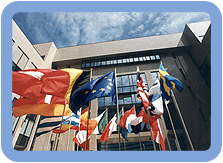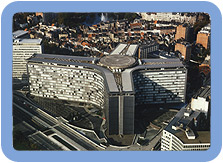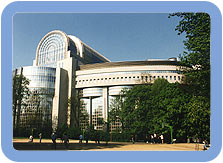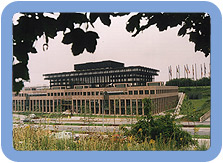 The Council of the European Union/Council of Ministers
The Council of the European Union/Council of Ministers
The Council of the
European Union (sometimes referred to as the Council or the Council of Ministers) is the main decision-making body of the European Union and can be compared to national legislative bodies or parliaments. The members of the Council are the ministers of the Member States, depending on the issue on the agenda before the Council, e.g. foreign affairs, agriculture, etc.
Depending on the issue that is being discussed, the Council meets in 9 configurations:
- General Affairs and External Relations
- Economic and Financial Affairs
- Competitiveness
- Co-operation in the fields of Justice and Home Affairs
- Employment, Social Policy, Health and Consumer Affairs
- Transport, Telecommunications and Energy
- Agriculture and Fisheries
- Environment
- Education, Youth and Culture
Regardless of the different sector composition within the Council, which depends on the issue on the agenda, the Council acts as a single institution. The presidency of the Council of Ministers rotates among the Member States every six months in accordance with a pre-established rota. The Treaty of Amsterdam stipulates that the Secretary General of the Council acts as the High Representative for the Common Foreign and Security Policy, and is assisted by the Deputy Secretary General, who is appointed by the unanimous decision of the Council and is in charge of managing the General Secretariat. Within the Union’s institutional triangle (the European Commission, the Council of the European Union and the European Parliament) the Council is the place where Member States’ interests are represented.
Decisions of the Council are prepared by the Permanent Representatives Committee (Fr. Comité des représentants permanents - COREPER) assisted by working groups made up of officials from national administrations.
 The European Commission
The European Commission
The European Commission
is one of the main EU institutions which represents and protects Community interests. The European Commission is often described as 'the integration engine', as it has the exclusive right to propose Community legal acts, policies and activity programmes. In addition, the European Commission is responsible for the implementation of decisions reached by the Parliament and the Council, and manages the budget and EU policies. The Commission also ensures the implementation of the founding treaties and other adopted legislative acts of the European Union on the international scene, for example, in negotiations for reaching agreements between the Community and third countries, based on the mandate that is in each separate case given to it by the Council of the European Union. The very name European Commission has a twofold meaning. In a narrower sense, the name refers to the 27 members of the European Commission, the so-called Commissioners (one for each of the Member States), including the President and five Vice-Presidents of the Commission. The Council of the European Union proposes Commissioners who are then appointed by the European Parliament to which the Commission is responsible. The Commission has a five-year term of office. Each Commissioner is responsible for one or more sectors or Directorates General, whose names indicate the area they cover (for example, DG Enlargement, DG Internal Market and Services, etc.) In a broader sense, the name European Commission refers to the institution and its employees. The headquarters of the European Commission are in Brussels, though a part of its working bodies are in Luxembourg.
The Commission has representations in all EU Member States and delegations in third countries, including Croatia.
The Treaty of Nice (the Enlargement Protocol) provides that after the enlargement of the European Union to 27 Member States, the Council shall unanimously decide on the maximum number of Commissioners, the number of which has to be smaller than the number of Member States, and who will be elected through a rotating system, taking into account the equal representation of all Member States.
 The European Parliament
The European Parliament
The European Parliament
is the assembly of the representatives of the 492 million Union citizens. Since 1979, these have been elected by direct universal suffrage for a five-year term of office. The number of MEPs elected in each Member State is distributed between Member States in proportion to their population and the total number of EU citizens. At present, the European Parliament has 785 representatives and its powers are: participation in the adoption of EU legal acts through co-decision, co-operation and consultation procedures; confirmation of appointments and suspensions of Commission members; appointment of Ombudsmen, members of the European Central Bank, the European Court of Auditors and other institutions; monitoring activities of the European Commission and the Council of the European Union; approval of the annual budget and others. Within the Union's institutional triangle (the European Commission, the Council of the European Union and the European Parliament), the Parliament represents the interests of the Union's citizens. The headquarters of the Parliament are in Strasbourg, although some sessions and meeting of parliamentary committees are held in Brussels, and a part of the administration is based in Luxembourg.
The European Ombudsman
The European Ombudsman
investigates complaints concerning irregular workings of EU institutions or bodies, such as the European Commission, the Council of the European Union or the European Parliament. Only the Court of Justice of the European Communities is not within its powers. The investigations of the European Ombudsman are based on complaints received, though he or she may start an investigation on his or her own initiative. The European Ombudsman does not investigate complaints against national, regional or local authorities even if complaints are related to activities in connection with the European Union. Every EU citizen or natural or legal person with permanent residence or an office registered in an EU Member State may reach the European Ombudsman in writing via mail, fax or e-mail.
 The Court of Justice of the European Communities
The Court of Justice of the European Communities
The Court of Justice of the European Communities (based in Luxembourg) is the only institution empowered to interpret provisions of the EU founding treaties. It has a twofold function: (1) responsibility for directly implementing Community law in certain cases and (2) general responsibility for interpreting provisions of EU legislation, with the purpose of securing its continuous and equal application. The Court may be called upon to decide on cases submitted by Member States, Community institutions or natural and legal persons. It provides identical interpretation of Community law throughout its territory in close co-operation with national courts through preliminary procedures for the interpretation of Community law. The Court of Justice of the European Communities is composed of 27 judges and 8 Advocates General. All judges are appointed by common accord by the governments of Member States for a renewable term of six years. The Court is helped by the so-called Court of First Instance whose task is to provide assistance in solving the thousands of cases brought before the Court and in providing better legal protection for citizens.
The European Court of Auditors
The European Court of
Auditors (based in Luxembourg) was founded in 1977 in order to audit the Union's incomes and expenditures and to attribute budgetary funds. The Court is composed of 27 judges and auditors, one from each Member State and appointed by the Council of Ministers for a six-year term.
The European Central Bank
The European Central Bank (based in Frankfurt) is a financial institution of the European Union established on 30 June 1998. As of 1 January 1999, it took over responsibility for implementing European monetary policy. Its main task is to maintain the stability of the euro.
The European Investment Bank
The European Investment
Bank (based in Luxembourg) is a financial institution of the European Union established in 1958 following the Treaty of Rome. The task of the institution is to contribute towards the balanced development of the European Community through economic integration and social cohesion. The European Investment Bank secures long-term financing of certain capital investments in the European Union as well as 120 countries that are not members of the Union.
The Economic and Social Committee
The Economic and Social
Committee (based in Brussels) is a consultative body of the European Union composed of different economic and social interest groups (employers, employees, non-governmental organisations) that gives opinions to other institutions, most often as part of the process of adopting new EU regulations. The Committee presently has 344 members who represent civil sector organisations in all 27 EU Member States.
The Committee of the Regions
The Committee of the
Regions (based in Brussels), after the Economic and Social Committee, is the second consultative body of the European Union and consists of representatives of regional and local authorities. The Committee was founded by the Treaty of Maastricht, and represents the interests of regions and local self-government at the Union level in the process of creating and implementing common policies. It is composed of 344 members delegated by regional and local government bodies in the EU Member States for a four-year term.
The European Council
The term 'European Council' was established by the Single European Act in 1986. It describes the practice of organising meetings of the heads of state or government of the European Union, during which political goals for the development of the Union and its policies are decided upon. The European Council is held 2 to 4 times a year.






![]() -
Croatian Academic and Research Network and
-
Croatian Academic and Research Network and
![]()